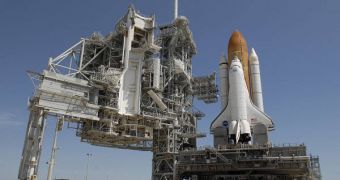If all goes according to plan, Saturday will see the launch of space shuttle Endeavor to the International Space Station, on the STS-127 construction mission. Seven astronauts will spend more than 16 days in space, performing five spacewalks, and upgrading the ISS with improved robotic arms, as well as with two new additions to the Japanese Kibo Science Module. The flight will also replace JAXA Astronaut Koichi Wakata with US Army Colonel Tim Kopra, a first-time NASA astronaut who will remain aboard the station as a flight engineer for Expedition 20.
According to the NASA launch manifest, the launch is scheduled to take place on Saturday, at 7:17 am EDT (1117 GMT), from the Kennedy Space Center complex, in Cape Canaveral, Florida. The shuttle has already been moved to Launch Pad 39A for this mission, after it spent some two weeks on Launch Pad 39B, serving as the back-up STS-400 contingency mission for space shuttle Atlantis' STS-125 to repair the Hubble Space Telescope. Once the second heat shield verification on its sister craft was deemed in order, Endeavor was cleared to move to the launch pad, and begin preparations.
“It's complex, it's challenging, it's long. It's going to be a really complicated choreography,” Mark Polansky, who will be the commander of the new flight, said of the mission. Joining him will be Pilot Douglas G. Hurley and Mission Specialists Christopher J. Cassidy, Julie Payette, from the Canadian Space Agency (CSA), David A. Wolf, Thomas H. Marshburn, and Timothy Kopra. The latter will be replaced by Wakata on the return trip.
The mission carries the Kibo Japanese Experiment Module Exposed Facility (JEM EF), the Kibo Japanese Experiment Logistics Module – Exposed Section (ELM-ES), the DRAGONSAT Payload (containing the Dual Picosatellites built by Texas A&M University and the University of Texas), as well as new replacement batteries and antennas for the station. The payload of ELM-ES will be transferred in orbit to the JEM EF, and then the former module will be deposited back in the shuttle's cargo bay.
“I'm just really excited about it. I really couldn't be happier. It'll be a little more of a personal place to work because there's more interaction with people. We have a lot of space, but it needs to be carefully choreographed so that it works out,” Kopra told about his upcoming stay on the International Space Station, Space informs.

 14 DAY TRIAL //
14 DAY TRIAL //